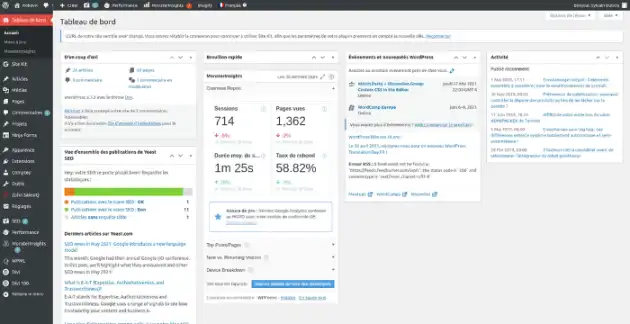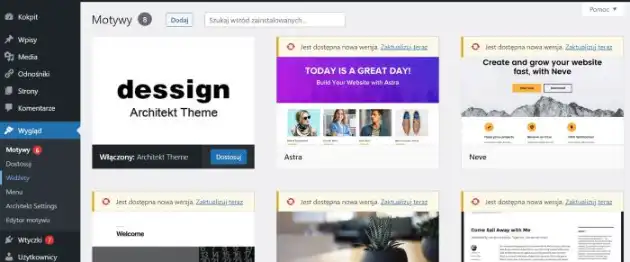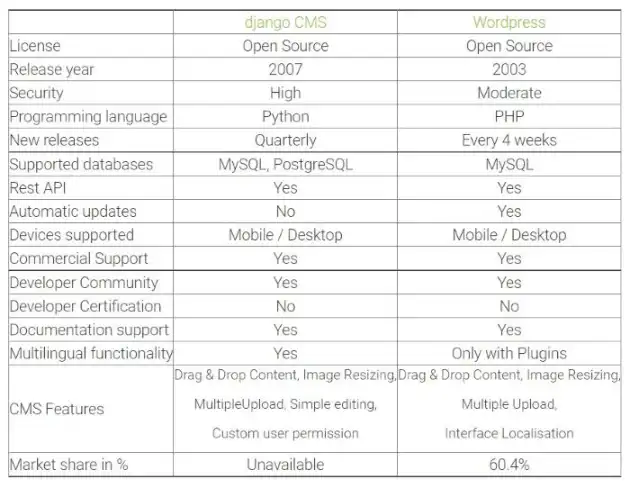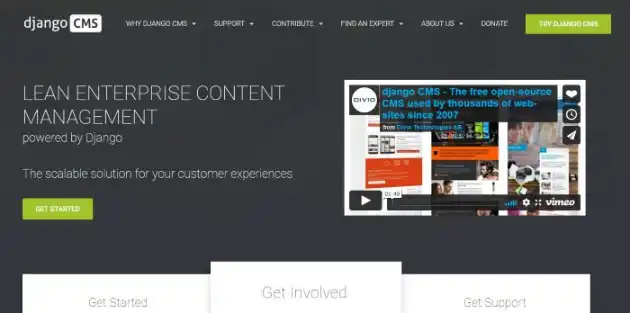WordPress vs. Django. A Content Management System (CMS) or a Web Framework? WordPress website or Django web app?
For many, it may resemble Christmas dilemmas. It can be associated with trying to prove the superiority of one holiday over another. It may seem like an academic debate.
We respect this approach, but we'll allow ourselves to disagree. The matter is more serious than that. Reducing it to a matter of personal preference somewhat clouds the issue.
A conscious choice between Django and WordPress is a choice made for the present and future business.
It's strictly strategic and has strictly strategic importance. An incorrect decision, motivated by a desire to save money or by considering a minor feature as crucial, can cause many problems.
All right, but what's the point? Well, it's about the differences, opportunities, strategies, and consequences that, in the short-term and long-term, arise from choosing and betting on one of the options for your web development project.
The dilemma often boils down to this. Is WordPress CMS better than Django CMS?
Let's point out right away that this is a poorly posed problem. Below we present a comparison of these two CMSes or, rather, two utterly different website content management approaches. We also prepared a separate cost comparison for creating a website based on WordPress or Django.
Why? We will answer this in a moment! As usual, we invite you to read it will be interesting, informative, and practical.
Why doesn't the Django vs. WordPress dilemma make sense?
The dilemma mentioned in the introduction of this article (WordPress vs. Django) makes no sense because we try to compare two different technologies and tools.
Although they share a common part (CMS), they differ in almost everything outside of it.
WordPress differs from Django just as a cat differs from a dog. Seemingly they are similar, and yet they don't necessarily belong to the same species.
What is WordPress? It's one of the world's most popular Content Management Systems (CMS).

WordPress is written in PHP and is available under the GNU General Public License (GPL), and initially, it was supposed to serve bloggers.
What is Django? Django is a backend web framework. Web Frameworks are platforms used to develop software, including websites of varying levels of complexity.
You can create a simple blog or a very advanced web application to achieve various business goals thanks to frameworks.
Frameworks are skeletons of applications, and they come with libraries and ready-made components.
They're much more comprehensive and complex tools with much broader applicability.
The term Framework is broader and encapsulates within itself the concept of a Content Management System. One of the components of Django is the CMS.
So comparing these two solutions doesn't quite make sense. But such comparisons are being made, so we will also add our pebbles to this garden.
WordPress vs. Django. Django or WordPress?
The simplest and most effective way to resolve the above dilemma is to answer the following questions:
- What is the purpose of the future web application?
- Who should the future web application serve?
- What type of application should it be?
- What tasks should the future web application make possible to perform?
These questions address goals, functions, and users, as well as the scale of a project, plans, and prospects of development in the present. They ask about the project's future, counted in years (web development).

These questions concern the scope of operations, the domain in which the application will operate, and the needs it will meet.
By this, we mean both the needs of users and owners of a web application.
Let's use an example.
Suppose a future application is a blog whose goal is to publish entries, articles, or notes. It is a means of self-expression for its owner.
It's a simple website with no complicated features (e.g., no account creation or content access fees).
It lets the author publish simple texts illustrated with simple graphic elements and allows its audience to read and comment on them. Then it's definitely worth using WordPress.
That's because WordPress is an ideal tool for creating a complete website or uncomplicated technological projects with a small scope that generate little traffic, which in practice means processing a small amount of data and interactions.
The more complex the project is in terms of business, technology, and functionalities. The more diverse goals, activities, and effects it's supposed to achieve, perform, and obtain, the more unsuitable, inadequate, and dysfunctional tool WordPress becomes.
For example:
When a project requires above-standard data security measures, custom data validation, specific user permissions, and different views for different types of users, it becomes more necessary to use a tool created to solve such problems.
Remember! WordPress wasn't created to address such problems effectively.
The more the project is innovative, custom, dedicated, and scalable, the more it is necessary to install Django.
Django makes it possible to deal with these problems:
- Quickly
- Effectively
- Comprehensively
- More economically.
WordPress vs. Django – the speed of execution of an MVP and a finished web application
Time is money, and in the case of developing web applications, it's an obvious and understandable truth.
The execution speed of the Minimum Viable Product (MVP), the most basic version in which the most basic features are offered, is much faster when using ready-made components available under the Django framework.

The creation of a finished version, fully functional, is also much faster when using a framework.
Of course, we refer to creating corporate content, social media, and streaming websites.
We mean developing complex web applications, B2B, financial (FinTech), or medical platforms (MedTech) or social media platforms.
The time efficiency and financial savings are definitely higher when using the Django framework. But how much? These differences will diversify each time, but they're certainly not cosmetic but counted in tens of percentage points.
Also, the cost of maintaining and developing an application (web development) is much lower if you make the right decision and decide to create it on the Django framework from the beginning, which is:
- An open-source web framework
- Can be used for commercial purposes
- Comprehensive
- Constantly developed and updated
- Efficient and extensive (in terms of components, libraries)
- Scalable
- Recommended for large and/or complex projects.
It's worth remembering that Django is a data-oriented backend framework, and a WordPress site is based on themes.
In practice, this means less work if we want to change specific data when we use Django and a lot more work if we use WordPress.
For example:
If we want to change information available on the site on multiple subpages, in different places, and on various themes, all we need to do is change it in the panel, only in one place.
In the case of a WordPress theme, we have to change it in every place on a website, and what's more, we need to remember all these places! A prize should go to the person who doesn't lose patience checking that the edition was successful and that the information is identical on each subpage!
Omitting some, and on websites with many subpages, this is possible (for example, when we have several hundred articles on the website where a piece of particular information repeats) is highly likely. In Django, we won't have such problems.
Django makes it possible to:
- Control data much easier
- Maintain data consistency
- Edit data faster, more confidently, and efficiently
- Manage data more effectively
- Better protect data.
The Django framework also offers a wide range of control over user and group permissions. By using these functions, we can precisely control what data can be managed and by whom.
Key differences - WordPress vs. Django
Of course, the above comparison doesn't exhaust all the differences. There are many more. Let's take a closer look at them.
Both WordPress and Django have their own security measures; however, Django definitely wins this comparison. With Django, resistance to attacks is higher, and at the same, the vulnerability to them is much lower.
WordPress has moderately effective ways to counter and protect against attacks. In addition, its resistance decreases with each plug-in installed (plug-ins can be found in the WordPress plugin directory). Such dependencies don't exist in Django, although it has its own collection of Django apps that can be reused.
The Django framework was developed in Python and WordPress in PHP.
Python is considered a much better technology, more suitable for creating complex projects, mainly corporate and content websites or sales platforms (B2C and B2B).
Updates, releases of new versions of Django and WordPress happen with varying frequency. Django is updated quarterly, and WordPress every two months.

Updates and their frequency are as helpful as they are problematic, as they require special vigilance regarding whether an update has caused errors in the operation of a site.
In the case of WordPress, this problem is particularly vital because the developers of different plug-ins show different reflexes when it comes to the speed of checking the adequacy of a plug-in for a new version of the CMS.
Anyone who at least once managed a website using the WordPress CMS, with multiple plug-ins from different providers, knows how unstable in terms of correct presentation of the Front-end layer such a site can be!
WordPress and Django also differ significantly in terms of supported databases:
- Django supports the following databases: MySQL, MariaDB, SQLite, PostgreSQL, Oracle
- WordPress supports the following: MySQL and MariaDB.
Last but not least! We'll repeat this. Django is a framework, not just a CMS like WordPress.
And as such, it guarantees greater:
- Reliability and stability of application operation
- Data security
- Efficiency of creating, maintaining, and developing applications
- Code correctness
- Flexibility
- Comprehensiveness – it doesn't limit us technologically, functionally, or in terms of business
- Scalability
- Ease and speed of prototyping
- Uniqueness of data validation
- Non-standard user permissions.
In terms of website development, the difference is enormous.
While Django makes it possible to implement any business logic and perform complex integrations with external APIs, WordPress doesn't have such capabilities.
In this sense, WordPress locks business owners within a narrow range of business opportunities, making it difficult to grow and adapt to changing business and market conditions.
WordPress can't prepare business owners for unexpected success, either. At some point, it won't be able to handle all the traffic, interactions, and user growth.
Differences in programming languages. Python vs. PHP
Significant differences also exist in the languages in which these tools were written. Python and PHP were created at roughly similar times (the first in 1989, the second in 1984).
PHP is a programming language developed to create simple, dynamic, easy-to-create websites.
Python is a language that is both simple and offers great possibilities. In addition, it's a much more concise language. Creating applications in Python is less time- and labor-intensive. The number of necessary lines of code is much smaller.
Its usefulness is confirmed by prestigious brands that use it, such as Google and NASA.
By the way, Google recommends it as the first choice language for Backend layer development. You can read more about Google's use of Python in the article "Python At Google. Python as an official language at Google".
Python is a much more comprehensive language. With its help, we can create web applications for various operating systems (Windows, Mac OS).
WordPress vs. Django – The ultimate comparison
After these detailed comparisons, we hope that the dilemma we started with (WordPress vs. Django) has become less problematic for you.

However, let's review all the facts collectively and indicate the range of applicability of each solution.
Django is definitely worth using when:
- The application we want to create will offer non-standard functions; it will have to meet complex, diverse, individual goals (in terms of business and usability)
- The application requires technologically advanced integrations
- The application will provide users with a variety of interactions
- The application will mainly be used to automate tasks
- We care about security, time, budget, results, strategy
- We want a better workflow when managing the content of the website
- It's necessary to maintain the speed of the CMS
- It's essential to integrate our application with any Django applications
- We want freedom and to avoid technological limitations.
WordPress is recommended for business owners:
- Whose applications accomplish few purposes, and they're simple and standard (e.g., are used for content presentation, portfolio presentation)
- Local businesses that don't require websites that need to handle numerous search queries and generate a lot of traffic
- Whose websites function mainly as business cards, aren't used by customers or business partners as a work tool, a tool for performing tasks
- For whom data security isn't a high priority – hacking a website doesn't involve a severe image, financial, legal, business, or organizational crisis
- Who don't have the knowledge, programming background, or budget to enlist the help of a professional web development company.
Comparison of WordPress and Django CMS. Summary
- The WordPress vs. Django dilemma should be a conscious choice regarding the present and future business.
- Betting on the Django framework or the WordPress CMS has strategic importance. Choices motivated by financial issues or a focus on minor features can have very damaging effects in the future.
- The WordPress vs. Django dilemma and the WordPress or Django question are poorly posed problems.
- When comparing the Django framework with the WordPress CMS, we compare two different technologies and tools.
- WordPress is one of the world's most popular Content Management Systems (CMS).
- Django is a Python-based web framework. Frameworks are platforms used to develop software, including websites of varying levels of complexity.
- Frameworks make it possible to create a simple blog or a very complex web application to achieve various business goals.
- Frameworks are much more comprehensive and complex tools with much broader applicability.
- The choice between WordPress and Django should be based on the answers to key questions, including: What is the purpose of the future web application? Who should the future web application serve?
- The more complex a project is in terms of business, technology, and functionalities, the more unsuitable, inadequate, and dysfunctional tool WordPress becomes.
- The more the project is innovative, custom, dedicated, and scalable, the more indispensable the Django framework becomes.
- The creation of a Minimum Viable Product (MVP) and a fully functional web application is much faster when using the Django framework.
- Django makes it possible to save time and achieve the desired effect with a smaller budget.
- Django is a data-oriented framework, and WordPress is theme-based.
- In practice, this means less work if we want to change specific data when we use Django and a lot more work if we use WordPress.
- Django makes it much easier to control data, keep it consistent, and protect it better.
- With Django, resistance to attacks is higher, and at the same time, the vulnerability to them is much lower.
- The Django framework was developed in Python and WordPress in PHP.
- Python is considered a much better technology, more suitable for developing complex projects, particularly corporate content websites and sales platforms (B2C and B2B).
- Django supports the following databases: MySQL, MariaDB, SQLite, PostgreSQL, and Oracle.
- WordPress supports: MySQL and MariaDB.
- Developing websites in Django guarantees greater reliability, application stability, data security, efficiency in creating, maintaining, and developing applications, code correctness, flexibility, comprehensiveness, scalability, ease, and prototyping speed.
- A website in Django makes it possible to implement any business logic and perform complex integrations with external APIs.
- Creating sites in WordPress locks business owners within a narrow range of business opportunities, making it difficult to grow and adapt to changing business and market conditions.
- PHP was developed to create simple, dynamic, and easy-to-create websites.
- Python is a language that is both simple and comprehensive. With its help, we can create web applications for various operating systems (Windows, Mac OS).
- WordPress vs. Django – is more of a business dilemma than a technological one; it boils down to the question of how to choose the most appropriate technology.






